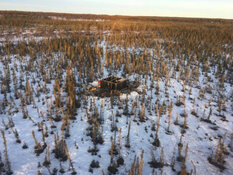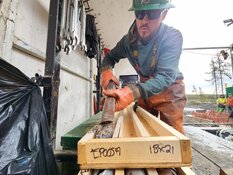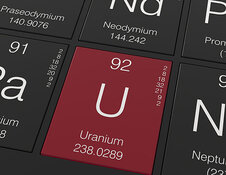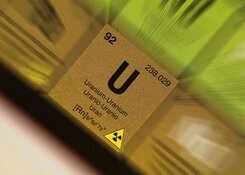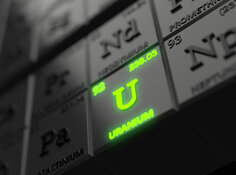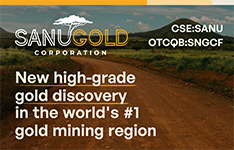North Shore Uranium Ltd. has executed an exploration agreement with the English River First Nation (EFRN) in Saskatchewan for its Flacon uranium property at the eastern margin of the Athabasca Basin, partner company Skyharbour Resources Ltd. announced in a release.
The agreement outlines "a number of areas of collaboration" between the ERFN and North Shore at Falcon, which North Shore is optioning from Skyharbour.
The ERFN is a First Nation with its main reserve, Wapachewunak Saskatchewan, located about 200 kilometers southwest of Falcon, the release said. ERFN's ancestral territory covers approximately 75,000 square kilometers of north-central Saskatchewan. Traditionally, people of the ERFN are known as the "People of the Great River," referencing the Churchill River.
The ERFN prides itself on being guided by ancestral traditions and the knowledge of their Elders while being a partner with industry and governments, according to the release.
"We believe that Saskatchewan's Athabasca Basin is the best jurisdiction in the world for uranium exploration and development," North Shore President and Chief Executive Officer Brooke Clements said. "North Shore places a priority on establishing positive relationships with communities near its activities. We are proud to establish an alliance with the English River First Nation and look forward to a long, mutually beneficial relationship."
Under North Shore's option agreement with Skyharbour, the company can acquire an initial 80% interest in Falcon by issuing shares worth CA$1.225 million, making aggregate cash payments of CA$525,000, and spending an aggregate of CA$3.55 million for exploration on the property over a three-year period.
Uranium Discovery Potential 'Significant'
North Shore said it has identified 36 uranium targets associated with electromagnetic (EM) conductor anomalies, which are often upgraded by other favorable geophysical and structural features, at Falcon.
They were selected based on the analysis and interpretation of multiple datasets by North Shore and its consultants. As reported last May, North Shore discovered near-surface uranium mineralization at two drill targets, P03 and P08, in an area that had never seen drilling.
North Shore has stated that its near-term priority is to assess the potential for an economic uranium deposit in the southeastern portion of the property by evaluating priority near-surface EM targets in the South Priority and South Walker Areas.
Falcon is located about 30 kilometers east of the active Key Lake uranium mill and former mine at the eastern margin of the Athabasca Basin in Saskatchewan, which processes uranium ore from the McArthur River Mine, one of two producing uranium mines in Canada.
Between 1983 and 2002, Key Lake Mine produced more than 200 million pounds of U3O8 at an average grade of over 2%, the company said.
The uranium discovery potential at Falcon is "significant" and includes shallow basement-hosted unconformity-style and pegmatite-hosted mineralization, according to the release. The property has seen limited modern exploration programs and there are a number of unexplained uranium occurrences.
 Streetwise Ownership Overview*
Streetwise Ownership Overview*
North Shore Uranium Ltd. (NSU:TSX.V)
Terra Clean Energy Corp. (TCEC:CSE; TCEFF:OTC; T1KC:FSE) is currently conducting a drill program at its Falcon East uranium project directly to the east.
North Shore will continue prioritizing targets at Falcon in pursuit of maximizing the chances of encountering economic uranium mineralization in its next drill program.
The Catalyst: Tech, AI Cos. Drive Grab for Power
As the fuel for nuclear power, uranium is one of the most important elements for the energy transition. However some worry U.S. President Donald Trump's tariff threats could raise prices since the U.S. gets more than a quarter of its uranium from Canada, reported Justine Calma for The Verge on March 7.
"It’s too soon to know what the exact impact would be on the U.S.'s nuclear energy industry if tariffs move forward," Calma wrote. "It could play into efforts to build up a domestic uranium supply, which has gotten bipartisan support and interest from major tech companies. But in the near term, the U.S. still relies on its northern neighbor to keep reactors running."
The spot uranium price flirted with US$100 per pound at the start of 2024 but has since retreated to the US$60s, reported Barry Fitzgerald for Livewire on March 20.
"But here's the rub," Fitzgerald wrote. "While the spot price has let the side down, the term or contract price for uranium has remained at multi-year highs (US$80/lb average in February). That really does matter as it is the term price that better reflects the long-term fundamentals of the uranium market."
High-tech and artificial intelligence (AI) companies are looking for more carbon-free power sources going forward. Microsoft just announced a 20-year deal with Constellation Energy to buy all of the power from the potentially reopened Three Mile Island plant, site of the worst nuclear disaster in U.S. history, to use for AI. The reactor in question closed five years ago and could be revived in 2028, depending on Nuclear Regulatory Commission approval.
Ownership and Share Structure
Insiders and founding investors own approximately 43.2% of the issued and outstanding shares. Clements himself owns 3.61%, Director Doris Meyer has 1.95%, and Director James Arthur holds 1.46. According to North Shore, 14.92 million shares (37.5%) held by six founding investors are subject to a voluntary pooling agreement that restricts disposition of these shares before October 19, 2026.
Most of the rest is with retail, as the institutional holdings are minor.
North Shore has 39.83 million outstanding shares.
The company currently has a market cap of CA$1.79 million. It has traded in the past 52 weeks between CA$0.03 and CA$0.14 per share.
| Want to be the first to know about interesting Uranium investment ideas? Sign up to receive the FREE Streetwise Reports' newsletter. | Subscribe |


